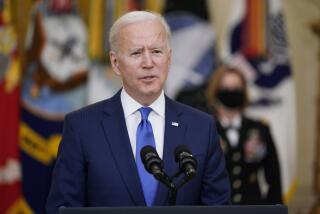Budget Could Cut Health Costs for Small Firms
- Share via
Small-business owners can expect a bit more help with their health insurance costs but little else in the way of new tax breaks as part of the omnibus budget deal Congress is expected to approve this week.
Advocates had pushed hard for big-ticket items such as estate tax reform and full deductibility for health-care premiums but had to settle for much less this time around.
“I’m afraid you have to look long and hard for bright spots in this budget for small business,” said Susan Eckerly, chief Senate lobbyist for the National Federation of Independent Business. “It’s long on spending and short on tax relief.”
Clearly, the biggest win for small firms is a modest acceleration of the march toward 100% deductibility of health insurance premiums. Starting next year, small-business owners would be able to deduct 60% of those costs from their federal tax returns, up from 45% in 1998.
The percentage would increase to 70% in 2002, with 100% deductibility in 2003. That’s four years sooner than the deadline of 2007 established by Congress last year.
“Obviously, a little is better than nothing, but we’re going to continue to push for immediate 100% deductibility next year,” said David D’Onofrio, director of government affairs for National Small Business United. “Small-business owners can’t wait until 2003 to be sick.”
The budget bill also includes some extensions of expiring tax credits that would assist small-business owners, including a research and development credit and breaks for hiring employees moving from welfare to work.
Barring last-minute changes on Capitol Hill, it appears the Small Business Administration’s fiscal 1999 budget would come in at about $820 million, according to officials at the SBA.
At first glance, that would appear to be significantly more than the $724 million the agency had asked for earlier this year. But $101 million of the new figure is a special appropriation from Congress to fund business disaster loans arising from Hurricane Georges.
Those extra funds would allow the SBA to guarantee as much as $1.1 billion in disaster loans in fiscal 1999, up from the $901 million it had requested as part of the budget process.
The SBA would be able to guarantee as much as $10 billion in loans under its popular 7(a) program in fiscal 1999. That’s less than the $11 billion in lending authority it had requested but more than the $9 billion in 7(a) loans it guaranteed in 1998. Under 7(a), a private sector bank makes the actual business loan, with the SBA guaranteeing 70% to 90% of the loan up to a maximum of $750,000.
The House approved the massive omnibus appropriations measure Tuesday, with the Senate expected to vote today.
More to Read
Inside the business of entertainment
The Wide Shot brings you news, analysis and insights on everything from streaming wars to production — and what it all means for the future.
You may occasionally receive promotional content from the Los Angeles Times.










